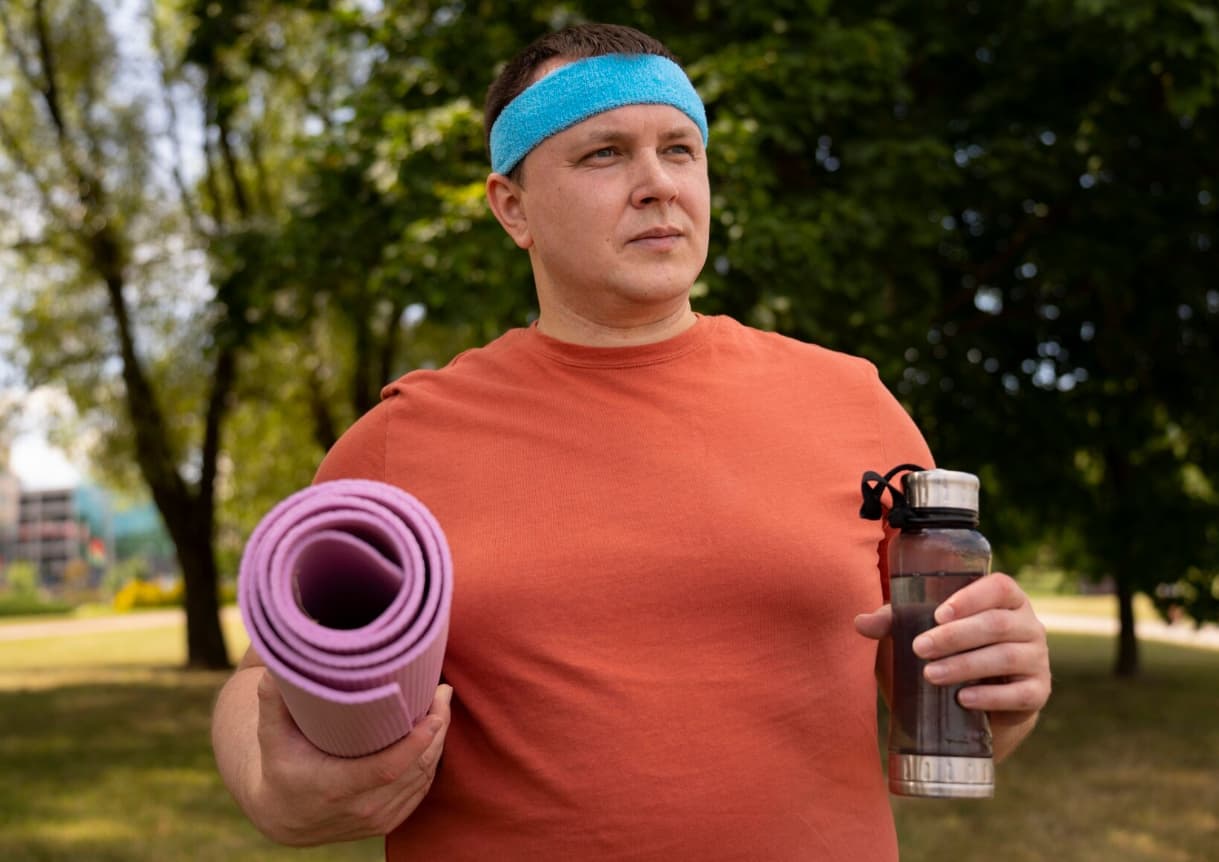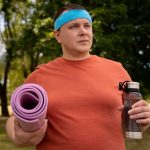Staying active after 40 is one of the best ways to keep your muscles strong, joints flexible, and heart healthy as you age.
Many people think their best fitness years are behind them, but that’s simply not true.
Your body changes as you get older, but that doesn’t mean you have to accept weakness or pain as normal.
Regular exercise can slow down and even reverse many age-related health problems. You can maintain your strength, balance, and energy well into your golden years.
The key is choosing the right types of exercise and starting at the right pace for your current fitness level.
You don’t need to run marathons or lift heavy weights to see real benefits. Simple activities like walking, swimming, and basic strength exercises can make a huge difference.
Many people over 40 worry about getting injured or doing too much too soon.
These concerns are valid, but they shouldn’t stop you from moving your body.
With proper guidance and a gradual approach, exercise becomes safer as you get stronger.
How to Stay Fit After 40 with Sports Activities?

This guide will show you exactly how to start exercising safely after 40.
You’ll learn which exercises work best, how to create a simple routine, and how to avoid common mistakes that lead to injury or burnout.
For practical plans and age-friendly workouts, visit Sports Guides
Why Exercise Helps As You Age?
Here’s how regular physical activity supports healthy aging:
- Keeps muscle mass and strength – Exercise prevents the natural muscle loss that starts in your 30s and 40s
- Maintains joint mobility – Moving regularly keeps joints flexible and reduces stiffness and pain
- Strengthens heart and lungs – Cardio exercise helps your cardiovascular system work more efficiently
- Lowers disease risk – Regular activity reduces the chances of diabetes, heart disease, and other chronic conditions
- Improves balance and prevents falls – Better stability and coordination help you stay safe and independent
Four Key Exercise Types
Every fitness routine after 40 should include these essential components:
- Strength training – Builds and maintains muscle mass to keep you strong for daily activities
- Cardio/aerobic exercise – Strengthens your heart, lungs, and improves overall endurance
- Flexibility and mobility – Keeps joints moving freely and reduces muscle tension and stiffness
- Balance and stability work – Reduces fall risk and improves coordination for better daily function
Simple Exercises for Each Type
Here are beginner-friendly exercises you can do at home or at the gym:
Strength exercises:
- Squats (sit-stand) – Use a chair for support and practice standing up and sitting down
- Wall push-ups – Stand arm’s length from a wall and push against it
- Resistance band rows – Pull the elastic bands toward your chest to strengthen your back
Cardio exercises:
- Brisk walking – Start with 10-15 minutes and gradually increase time
- Stationary cycling – Low-impact option that’s easy on joints
- Swimming – Excellent full-body workout with minimal joint stress
- Low-impact aerobics – Follow along with beginner-friendly video classes
Flexibility exercises:
- Gentle hamstring stretches – Reach toward your toes while sitting or standing
- Shoulder rolls – Roll your shoulders backward and forward to reduce tension
- Hip openers – Simple stretches to keep hips flexible and pain-free
Balance exercises:
- Single-leg stands – Hold onto a chair and practice standing on one foot
- Heel-to-toe walking – Walk in a straight line, placing one foot directly in front of the other
- Step-ups – Use stairs or a sturdy platform to practice stepping up and down
Step-by-Step: How to Start Safely After 40
Follow these steps to begin exercising safely and effectively:
- Check with your doctor – Get medical clearance if you have health conditions or haven’t exercised recently
- Start slowly – Begin with just 10-15 minutes if you’re new to regular exercise
- Build a balanced routine – Add strength training twice weekly and cardio 3-5 times per week
- Increase gradually – Add 5 minutes or light resistance each week as you get stronger
- Include rest days – Don’t train intensely every day; your body needs time to recover and adapt
Simple Weekly Plan
| Day | Activity | Time | Note |
|---|---|---|---|
| Mon | Strength (full body) | 20-30 min | Use light weights or resistance bands |
| Wed | Cardio (walk or cycle) | 30 min | Keep at a moderate, comfortable pace |
| Fri | Strength + Balance | 20-30 min | Add single-leg exercises and stability work |
| Sat | Cardio or an active hobby | 30-45 min | Swimming, hiking, dancing, or sports you enjoy |
Progress Tips
Use these strategies to keep improving safely over time:
- Add 5 minutes per week – Gradually increase workout time until you reach your goals
- Increase resistance slowly – Add weight or resistance only when the current level feels easy
- Keep a simple exercise log – Track date, activity type, and how you felt during and after
- Join local groups or classes – Social support helps you stay motivated and consistent
Nutrition and Recovery
Support your exercise routine with these healthy habits:
- Eat protein with meals – Include lean meat, fish, eggs, or beans to support muscle maintenance and growth
- Stay well hydrated – Drink water before, during, and after exercise, especially in hot weather
- Eat plenty of fruits and vegetables – These provide vitamins and minerals your body needs for recovery
- Get 7-8 hours of sleep – Quality rest is when your body repairs and strengthens muscles
- Do gentle stretching after workouts – Light stretching helps prevent soreness and maintain flexibility
Safety and Common Issues
Follow these important safety guidelines to prevent injury:
- Always warm up and cool down – Spend 5 minutes preparing your body before and after exercise
- Stop if you feel concerning symptoms – Chest pain, dizziness, or unusual shortness of breath require immediate attention
- Choose low-impact options – If you have joint pain, avoid high-impact activities like running on hard surfaces
- Use proper equipment – Wear supportive shoes and use correct form to prevent injuries
- Listen to your body – Some muscle soreness is normal, but sharp pain means you should stop and rest
Sample 15-Minute Beginner Routine
Try this simple routine to get started with regular exercise:
- 2 minutes warm-up – March in place or walk around to get your blood flowing
- 8 minutes strength circuit – Do sit-to-stand squats (10 reps), wall push-ups (8 reps), resistance band rows (10 reps), and step-ups (10 each leg)
- 3 minutes balance practice – Single-leg stands for 20-30 seconds on each leg, holding a chair for support
- 2 minutes of gentle stretching – Stretch your hamstrings, shoulders, and any tight areas
FAQs:
- How many days a week should I exercise?
Aim for 3-5 days with a mix of strength training, cardio, and flexibility work.
- Is strength training safe after 40?
Yes, it’s very beneficial when you start with light weights and focus on proper form.
- Can older adults still build muscle?
Absolutely – with regular resistance training and adequate protein, people can gain muscle at any age.
- What if I haven’t exercised in years?
Start very slowly with just 10-15 minutes of walking and gradually build up your fitness level.
- How do I know if I’m exercising too hard?
You should be able to hold a conversation during moderate exercise; if you’re gasping for breath, slow down.
Conclusion and Call to Action
Small, regular steps in your fitness routine will keep you stronger, healthier, and more independent as you age. You don’t need to become a fitness fanatic – just consistent.
The key is starting where you are now and building slowly over time. Every bit of movement counts toward better health and quality of life.
Remember that it’s never too late to start exercising. Many people begin fitness routines in their 50s, 60s, and beyond with great success.
Use the Sports Guides link above for easy workout plans and routines specifically designed for adults over 40 who want to stay strong and healthy.
Authority Links
- American College of Sports Medicine (ACSM) — https://www.acsm.org
- National Institute on Aging (NIA) — https://www.nia.nih.gov
- American Heart Association — https://www.heart.org
- Centers for Disease Control & Prevention (Physical Activity) — https://www.cdc.gov/physicalactivity
- Harvard Health — https://www.health.harvard.edu
- Mayo Clinic (exercise and aging) — https://www.mayoclinic.org







